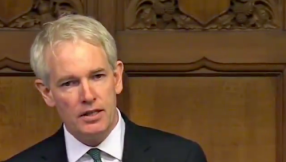There was a time, not so long ago, when Rob Bell was seen as the great hope of the evangelical church. His Nooma DVDs had captured the imaginations of a generation of Christians who'd finally found something different to do in their small group. His first book Velvet Elvis, while a little provocative, engaged hundreds of thousands of people worldwide with the Bible and theology. His preaching – which was fuelled by hours of weekly study in a Jewish library – inspired many more to revisit the Bible, and to read it more deeply.
Some were suspicious of aspects of Bell's theology, but his growing church, and the fact that he was getting people to read the Bible, placated them. Until of course, he wrote his infamous book Love Wins, which queries (though doesn't directly state) whether actually, God saves everyone anyway, and sends us all to heaven. And at that point, all hell broke loose.
The backlash from theologically reformed quarters was heavy-handed and brutal. Motivated by the chance to defend a central doctrine of the faith, church leaders, bloggers (and even Martin Bashir) laid into Bell. They called him a heretic. John Piper – a figurehead of sound doctrine for so many – illustrated the approach to devastating effect with a single, three-word tweet.
Serious stuff
I came to faith as a teenager in a reformed, conservative evangelical church. The Bible was the inerrant word of God, the men in the pulpit were very, very serious (because you see, sin is a serious subject), and I was quickly transitioned into a heavy duty programme of discipleship designed to make sure I became very, very serious about certain things too – Hell especially.
If this sounds however, like the start of a confessional about my journey into some sort of redemptive light, then forgive me. I will always love that church; because they sent a worker into my school to tell me about Jesus, the entire course of my life pivoted dramatically.
I ended up in a slightly more middle-of-the-road Baptist church, where Hell was slightly less warm and sin was a tiny bit less serious. I didn't make the move for theological reasons (I was 14), but because of pretty girls and the chance to play a lot more football. Doubtless that move was another shift in the course of things, but despite it I retained – and still retain – a love and respect for those churches and Christians who place themselves closer to John Piper than Rob Bell on the theological spectrum.
And I have a hunch that they're right about a lot of stuff. The sin is more serious than we often seem to think; that the Bible should be central to our lives; that eternal life is real and only accessible through Christ; and that we should be far more motivated in personal evangelism because of those things. I don't align myself with every aspect of reformed theology, but there's an awful lot that I was taught in that church that I can still say amen to.
Yet for some reason, in 2014, the more conservative voice is regularly losing the argument. From representation in the Anglican House of Bishops to online dialogue, the more reformed 'side' (although I hate drawing battle lines) is either marginalised or shouted down. And while there are myriad reasons for this, I believe that in truth it comes down to one factor, epitomised in that John Piper tweet:
Conservatives often aren't very nice.
That might sound lightweight (especially to a conservative), but hear me out. Culture has changed irrevocably in the last 20 years. The Communications Revolution has totally shifted how we engage with each other – in friendship, in work, and in debate. We have access to far more information, and a greater array of voices, than any other generation in history. As part of that, there is now a widespread tendency for all of us to be a lot broader and to some degree, shallower. Flooded with information, we're likely to be a little less rooted in our convictions. We are more susceptible to the compelling voice or story; to the brilliant soundbite.
The compelling voice
A 'compelling' voice isn't just wise, radical and intellectually or emotionally stimulating. It's also kind and compassionate. It comes from a place of love, and is characterised by that. Those who argue from a more 'liberal' theological perspective (again, sorry to create 'sides', but it's impossible not to) tend to be good at this. Big ideas, expressed with kindness, have real currency in the modern world.
However, when we turn to the more conservative voices, there's often a very different tone. The big ideas are still there, but the kindness has evaporated, to be replaced with anything from over-confident condescension to discourteous rudeness. John Piper's infamous tweet is one example. David Robertson's article attacking Steve Chalke on this website is, I'm afraid, another. This isn't how you win arguments – it's just how you help both 'sides' become more entrenched in their positions.
In conservative circles, I often hear the defence that 'The Gospel is offensive.' Which is true, especially in this culture. But arguably the most offensive aspect of the Gospel isn't the call to repentance, but the Grace of God. The counter-cultural-ness of the message we carry doesn't give us a licence to tear each other down, or to engage in theological or intellectual one-upmanship. This message gives us licence only to love.
Progress?
This all matters because the idea of what it means to be 'progressive' has become lop-sided in the digital culture. Because the more liberal voices are the only ones that seem to speak the language of that culture, progressive and liberal have become interchangeable words. Which is kind of darkly funny when you consider that progressive used to be interchangeable with 'reformed' – or as Mark Driscoll's former Acts 29 friends would put it, 'resurged.'
Theological difference and debate is essential if the church is to continue to flourish. Progress is important, because while God doesn't change, our understanding of him does – and over time that understanding should grow. That understanding has often been enabled by discussion, debate and difference. The problem is that the rules of engagement have changed since I sat and listened to those serious men in the pulpit 20 years ago, and it seems that no-one has told them.
While division in the church is unhelpful, diversity within it is wonderful. Different views, voices and perspectives are like the many component parts of an orchestra, strengthening and complementing one another. When we argue, or act discourteously, we're not only the metaphorical orchestra out of tune, but we put outsiders off. Just as reading Richard Dawkins has probably sent thousands of people on Alpha and Christianity Explored courses, so the stench of a disunited church sends people running in the opposite direction. And within the church exactly the same is true; no-one engages with a different position to their own when the person proposing it is being unkind.
I believe the conservative voice is losing the argument – and the right to be called progressive – because their tone is so often so wrong. While it's practically heresy for some to say so, we could all learn a thing or two about gracious engagement from Steve Chalke, who rarely lashes out at his many detractors, and Rob Bell, who seemed to walk around in a kind of puzzled daze after the conservative world turned on him. The message can, and must, remain the same, but the grumpy, condescending tone needs to be replaced with grace, an ability to listen, and perhaps most importantly, the joy we claim to carry.
This isn't about being right, it's about being right, in the right way. The Gospel might be offensive. That doesn't mean we need to be.
Martin Saunders is an author, screenwriter and the Deputy CEO of Youthscape. Follow him on Twitter @martinsaunders




















